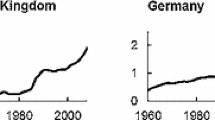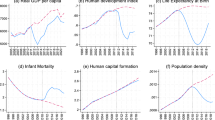Abstract
In the literature, theory and empirical evidence on the nexus of political freedom, economic freedom, and economic growth are mixed. In this paper, we test the hypothesis that the effect of political freedom on promoting economic growth is realized and detectable at later stages of social and economic development. Using panel data for a sample of 104 countries between 1970 and 2003, we find strong support for our hypothesis. While economic freedom has greater effects on income convergence in the OECD countries, political freedom clearly promotes the convergence among those OECD countries.
Similar content being viewed by others
References
Bardhan, P. (1993). Symposium on democracy and development. Journal of Economic Perspectives, 7, 45–49.
Barro, R. (1991). Economic growth in a cross section of countries. Quarterly Journal of Economics, 106, 407–444.
Barro, R. (1996). Democracy and growth. Journal of Economic Growth, 1, 1–27.
Barro, R. (1999). Determinants of democracy. Journal of Political Economy, 107, 158–183.
Barro, R., & Sala-i-Martin, X. (1991). Convergence across states and regions. Brookings Papers on Economic Activities.
Barro, R., & Sala-i-Martin, X. (1992). Convergence. Journal of Political Economy, 100, 223–251.
Barro, R., & Sala-i-Martin, X. (2004). Economic growth (2nd ed.). Cambridge: MIT.
Baumol, W. J., Nelson, R., & Wolff, E. N. (Eds.). (1994). Convergence of productivity. New York: Oxford University Press.
Blanchard, O., & Shleifer, A. (2000). Federalism with and without political centralization: China versus Russia. NBER Working Paper 7616.
Clague, C., et al. (1996). Property and contract rights in autocracies and democracies. Journal of Economic Growth, 1, 243–276.
Dasgupta, P. (1993). An inquiry into well-being and destitution. New York: Oxford University Press.
De Haan, J., & Siermann, C. L. J. (1995). New evidence on the relationship between democracy and economic growth. Public Choice, 86, 175–198.
De Haan, J., Lundstrom, S., & Sturm, E. (2006). Market-oriented institutions and policies and economic growth: a critical survey. Journal of Economic Surveys, 20, 157–181.
Dowrick, S., & Nguyen, D. (1989). OECD comparative economic growth 1950–1985: Catch-up and convergence. American Economic Review, 79, 1010–1030.
Farr, et al. (1998). Economic freedom, political freedom, and economic well-being: A causality analysis. Cato Journal, 18, 247–262.
The Freedom House. (2005). Freedom in the world country ratings, 1972 through 2003. Washington: the Freedom House.
Friedman, M. (1962). Capitalism and freedom. Chicago: University of Chicago Press.
Friedman, M. (1992). Do old fallacies ever die? Journal of Economic Literature, 30, 2129–2132.
Grier, K. B., & Tullock, G. (1989). An empirical analysis of cross-national economic growth, 1951–1980. Journal of Monetary Economics, 24, 259–276.
Gwartney, M., & Lawson, R. (2005). Economic freedom of the world: 2005 annual report. Canada: the Fraser Institute.
Haggard, S. (1997). Democratic institutions and economic policy. In C. Clague (Ed.), Institutions and economic development. Baltimore: Johns Hopkins University Press.
Huntington, S. P. (1968). Political order in changing societies. New Haven: Yale University Press.
Im, K. S., Pesaran, M. H., & Shin, Y. (2003). Testing for unit roots in heterogeneous panels. Journal of Econometrics, 115, 53–74.
Islam, N. (1995). Growth empirics: a panel data approach. Quarterly Journal of Economics, CX, 1127–1170.
Kormendi, R. C., & Meguire, P. G. (1985). Macroeconomic determinants of growth: cross-country evidence. Journal of Monetary Economics, 16, 141–163.
Lawson, R. A. (2006). On testing the connection between economic freedom and growth. Econ Journal Watch, 3, 398–406.
Levin, A., Lin, C. F., & Chu, C. (2002). Unit root tests in panel data: asymptotic and finite-sample properties. Journal of Econometrics, 108, 1–24.
Levine, R., & Renelt, D. (1992). A sensitivity analysis of cross-country growth regressions. American Economic Review, 82, 942–963.
Li, H., & Xu, Z. (2007). Economic convergence in seven Asian economies. Review of Development Economics, 11, 531–549.
Navarro, V. (2000). Development and quality of life: A critique of Amertya Sen’s ‘development as freedom’. International Journal of Health Services, 30, 661–674.
Nelson, M. A., & Singh, R. D. (1998). Democracy, economic freedom, fiscal policy, and growth in LCDs: A fresh look. Economic Development and Cultural Change, 46, 677–696.
North, D. C. (1990). Institutions, institutional change, and economic performance. New York: Cambridge University Press.
Paldam, M. (2003). The economic freedom of Asian tigers: an essay on controversy. European Journal of Political Economy, 19, 453–477.
Persson, P., & Tabellini, G. (1992). Growth, income distribution and democracy. European Economic Review, 36, 593–602.
Przeworski, A., & Limongi, F. (1993). Political regimes and economic growth. Journal of Economic Perspectives, 7, 51–69.
Quah, D. (1993). Galton’s fallacy and tests for the convergence hypothesis. Scandinavian Journal of Economics, 95, 427–443.
Rao, V. (1984). Democracy and economic development. Studies on Competitive International Development, 19, 67–81.
Rodrik, D. (1998). Why do more open economies have bigger governments? Journal of Political Economy, 106, 997–1032.
Rodrik, D. (1999). Where did all the growth go? External shocks, social conflict, and growth. Journal of Economic Growth, 4, 385–412.
Romer, P. M. (1986). Increasing returns and long-run growth. Journal of Political Economy, 94, 1002–1037.
Sachs, J. D., & Warner, A. M. (1995). Economic convergence and economic policies. NBER Working Paper 5039.
Scully, G. W. (1988). The institutional framework and economic development. Journal of Political Economy, 96, 652–662.
Scully, G. W. (1992). Constitutional environments and economic growth. Princeton, New Jersey: Princeton University Press.
Sen, A. (1999). Development as freedom. New York: Knopf.
Vasil, R. (2001). Governing Singapore: A history of national development and democracy. St. Leonards: Allen & Unwin.
World Bank (1991). The world development report 1991. New York: Oxford University Press.
World Bank (2005). World development indicators on CD-ROM. Washington: The World Bank.
Wu, W., & Davis, O. A. (1999). The two freedoms, economic growth and development: An empirical study. Public Choice, 100, 39–64.
Author information
Authors and Affiliations
Corresponding author
Rights and permissions
About this article
Cite this article
Xu, Z., Li, H. Political freedom, economic freedom, and income convergence: Do stages of economic development matter?. Public Choice 135, 183–205 (2008). https://doi.org/10.1007/s11127-007-9253-y
Received:
Accepted:
Published:
Issue Date:
DOI: https://doi.org/10.1007/s11127-007-9253-y




